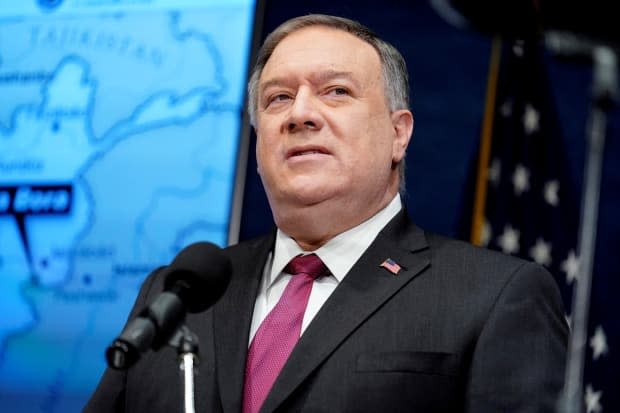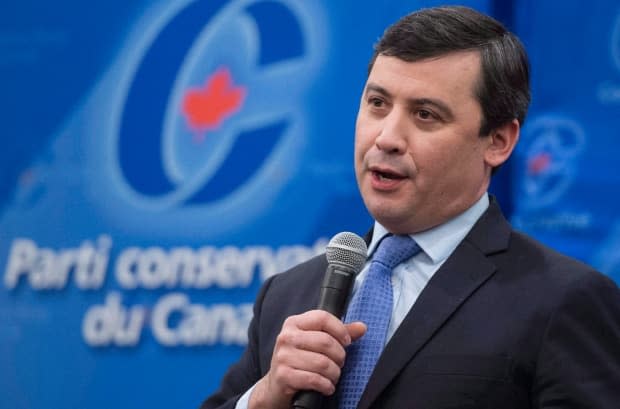Why the genocide question about China is hard for the Trudeau government to answer

(Emrah Gurel/AP Photo - image credit)
The Conservative motion about China's treatment of its Uighur Muslims, which will come to a vote in the House of Commons on Monday evening, is not simply about whether the country is committing genocide. It's also about whether the government of Canada — or perhaps any country outside the United States — can or should say so.
And it's about Canadian politics — and a debate between the Liberals and Conservatives about the right approach to China.
Outside of China, there is widespread agreement that the Chinese regime has committed gross human rights violations against Uighur Muslims. A campaign of repression and allegations of abuse have been documented by media outlets like the New York Times and the BBC.
Last fall, Canada was among a group of 39 nations that outlined a series of "grave" concerns and called on China to allow for independent inspectors.
The House of Commons subcommittee on international human rights studied the situation and concluded in October that China's actions constituted a genocide, as defined by the genocide convention that was adopted by the United Nations in 1948.
Irwin Cotler, a former Liberal justice minister, also believes that China's treatment of Uighur Muslims amounts to a genocide.
But so far only one country — the U.S. — has officially declared that China is committing genocide. Boris Johnson, the United Kingdom's prime minister, pointedly declined to make the same declaration when he was asked a month ago.
Only U.S. has officially used term
On Friday, it was also reported by Foreign Policy magazine that the initial declaration of genocide by Donald Trump's administration — which was made on Jan. 19, one day before Joe Biden was inaugurated — was issued despite the misgivings of State Department lawyers, who did not believe there was sufficient evidence to say China's actions met the high bar necessary to declare that a genocide is occurring.

In January, former U.S. Secretary of State Mike Pompeo said the Trump administration determined that China had committed 'genocide and crimes against humanity' in its repression of Uighur Muslims in the country's Xinjiang region.
That reporting doesn't mean that China isn't committing a genocide, but it does weaken somewhat the argument that Canada should follow the American lead in making that declaration at this moment.
Trudeau is not wrong when he says, as he did last week, that the international community needs to be careful about the use of the term "genocide." Casual usage of the word could cheapen its significance. But a process for making that determination still seems mostly hypothetical — the Trudeau government has called for an independent investigation, but China is unlikely to ever agree to that.
The current debate in Canada can't be disentangled from the months of back-and-forth between Conservatives and Liberals that preceded it. Particularly since Erin O'Toole became leader of the Conservative party, the Conservatives have taken a keen interest in China and jumped at any opportunity to portray Trudeau's approach to China as weak or naive.
Since Canadians Michael Kovrig and Michael Spavor were imprisoned in China, the Trudeau government has acted carefully. It has not, for instance, ruled on whether Huawei, the Chinese technology company, can participate in Canada's 5G networks.
At the same time, Trudeau has flatly dismissed suggestions that his government should drop extradition proceedings against Meng Wanzhou, the Huawei executive whose arrest in Vancouver, at the behest of the U.S., led China to arrest Kovrig and Spavor.
The problems with acting alone

The Conservatives under Erin O'Toole have demanded that Canada formally declare the oppression of Uighur Muslims in China a genocide, while the Trudeau government has approached the issue more carefully.
When the Trudeau government has acted or spoken about China in the past year, it has tended to do so in concert with other countries. In January, for instance, Canada joined the U.S., Australia and the U.K. in condemning the arrest of democratic activists in Hong Kong. In response to China's actions against Uighurs, the Trudeau government partnered with the U.K. to ban the importation of Chinese products made by forced labour.
Last week, the Trudeau government led a coalition of 58 countries to denounce state-sponsored arbitrary detention. Though the statement did not directly mention China, the implication was clear.
Acting as part of a group has its merits. On its own, Canada's power to change China is limited and Canada's allies might not appreciate this country getting ahead of them.
Acting alone also makes it easier to be singled out by China for retribution — and Canada ultimately stands to lose more in any one-on-one dispute with a much larger and more economically powerful country that buys Canadian goods and sells affordable products.
Hesitancy on genocide a difficult position
A declaration of genocide would also lead to questions about what this government is prepared to do to stop it.
Trudeau would no doubt like to move in concert on this issue as well — and he could be asked how much effort he has expended in pushing for such action. But an expansive multilateral effort seems unlikely to come together before the Conservative motion comes to a vote on Monday evening.
And that seems likely to result in a split among Liberals — with some Liberal backbenchers voting in favour of the motion, while the cabinet votes against or abstains.
Trudeau's insistence on being precise in the government's language might be unsatisfying. And perhaps it would be difficult for any prime minister to publicly discuss the realpolitik that likely lies beneath every matter of foreign affairs.
But Trudeau and his government are now in constant danger of seeming insufficiently "tough" in the face of China's aggression. The Liberals might not be willing to act according to the Conservative Party's timeline, but hesitancy in the face of a possible genocide is a difficult position to maintain, and could age very poorly.
Approaching China's 'belligerence'
Ultimately, the Conservative motion is also a reminder that the greater question about how to approach China is not going to go away anytime soon. The profound predicament posed by China was neatly framed by two questions asked during last week's debate in the House.
The first question was posed by Green MP Elizabeth May, who asked Conservative foreign affairs critic Michael Chong to "reflect" on concerns that "being more aggressive in our communications" could make it harder to gain the release of Kovrig and Spavor.
In response, Chong said his party was "very concerned" about Kovrig and Spavor, but he danced around the substance of May's question. He didn't say those fears were unfounded, nor did he say that the potential risk to Kovrig and Spavor's welfare was worth taking.

Conservative foreign affairs critic Michael Chong introduced the Conservatives' opposition day motion.
But Chong said "we strongly believe that being passive in the face of these threats is clearly not the way to respond to China's belligerence."
A few minutes later, Chong rose to ask his own question of Foreign Affairs Minister Marc Garneau: "Does the minister worry that equivocation in response to China's belligerence and threats ... sends a message to China that these threats and this belligerence works?"
Garneau seemed to acknowledge that this was, in fact, a very good question. "I very much appreciate the question from my colleague, which is complex and one that I assure him our government is seized with," the minister said.
The longer China seems prepared to carry on undaunted, the stronger the case will be for a more aggressive approach — from Canada and from every other country in the world.

